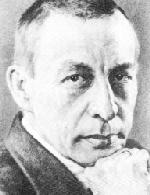Sergei Vassilievich Rachmaninoff
Russian composer in the Romantic style
1873 - 1943
Sergei Rachmaninoff was born on April 1, 1873, at Semyonovo, a large estate near the ancient city of Novgorod, Russia. His father, an army officer, gambled, drank, and squandered nearly all of his wife's considerable inheritance. Vassily Rachmaninoff left his wife when Sergei was nine years old, and Sergei's sister Sofia died soon thereafter. The family was forced to auction off Semyonovo to pay their debts and move to St. Petersburg, where Sergei enrolled in the conservatory to continue his piano studies.
By all accounts, Sergei was a problem child, but he had an extraordinary talent at the piano. Aware of his natural gift and still reeling from the troubles within his family, Sergei did not invest much effort in his studies. In 1885 he failed all of his exams at the St. Petersburg Conservatory and was sent to Moscow to study and live with Nikolai Zvereff, one of Russia's leading music teachers who taught at the Moscow Conservatory and proposed to discipline Sergei. Four years with Zvereff gave Sergei a new outlook on life as well as music. Their relationship came to an abrupt end in 1889, when Zvereff refused to give Sergei a private room to compose in and Sergei left to study with his cousin Alexander Ziloti.
In 1892, Sergei graduated from the conservatory with high honors and a commendation from Tchaikovsky himself on Rachmaninoff's thesis project, the opera Aleko. Sergei's work slowly continued to gain recognition and praise until 1897, when the premiere of his First Symphony met with an unprecedented abysmal reception. Sergei suffered a severe psychological setback which caused a complete loss of self-confidence and left him unable to compose for the next three years. It took a series of sessions with the hypnotist Dr. Nikolai Dahl to restore Rachmaninoff's confidence in his creative abilities. By 1900 he had begun work on his Second Piano Concerto and a year later, despite religious objections, he married his first cousin, Natalya Satina. Their daughter Irina, later to wed Prince Pyotr Volknosky, was born in 1903.
In 1909, Sergei made his first visit to the United States on a concert tour and was greeted with open arms. After, he would visit America once every season, even though he maintained a primary residence at Ivanovka, his recently inherited estate in Russia. After the October Revolution of 1917 Rachmaninoff relocated briefly to Stockholm, but his affection for the United States resulted in his moving to New York in 1918 and purchasing a home there, on Riverside Drive and appropriately decorated to imitate the atmosphere of Ivanovka, in 1921.
Before 1918, Rachmaninoff wrote some 135 compositions, but after his self-imposed exile his total output was only nine or ten works. His music, however, remained characteristically Russian, even though he was a vocal opponent of the newly-established Communist regime, publicly announcing his criticisms in the New York Times. Sergei Rachmaninoff died in Beverly Hills on March 28, 1943, only a few weeks after attaining his American citizenship and only five days before his seventieth birthday.
|
Some of Rachmaninoff's most famous work:
- Concertos for Piano Nos. 1 in F Sharp Minor, op. 1 (1891), 2 in C Minor, op. 18 (1900), 3 in D Minor, op. 30 (1909), & 4 in G Minor, op. 40 (1909)
- Morceaux de Fantasie, op.3 (1892)
- Sonatas for Piano Nos. 1 in D minor, op. 28 (1907) & 2 in B Flat Major, op. 36 (1913)
- Symphony No. 2 in E Minor, op. 27 (1907)
- The Isle of the Dead, op. 29 (1909)
- Various Etudes, Preludes, Mazurkas, Scherzos, etc. for piano
Background music: Prelude in C Sharp Minor, op. 3, no. 1
Back to Classical Music
Portions of the text copyright © Lee Lambert
